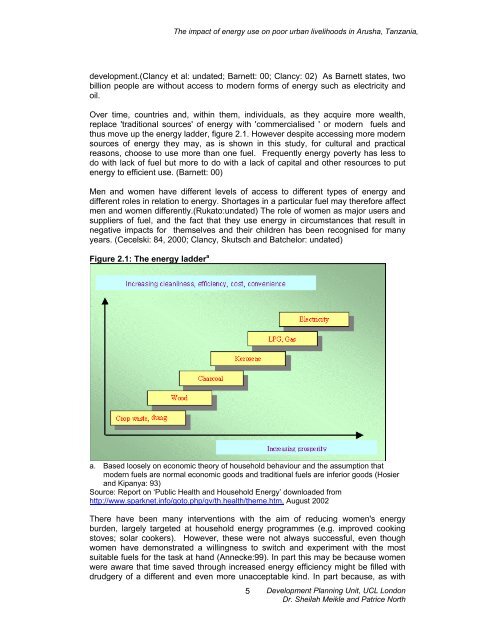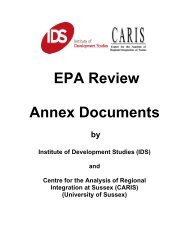The Impact of Energy Use on Poor Urban Livelihoods in ... - DfID
The Impact of Energy Use on Poor Urban Livelihoods in ... - DfID
The Impact of Energy Use on Poor Urban Livelihoods in ... - DfID
Create successful ePaper yourself
Turn your PDF publications into a flip-book with our unique Google optimized e-Paper software.
<str<strong>on</strong>g>The</str<strong>on</strong>g> impact <str<strong>on</strong>g>of</str<strong>on</strong>g> energy use <strong>on</strong> poor urban livelihoods <strong>in</strong> Arusha, Tanzania,<br />
development.(Clancy et al: undated; Barnett: 00; Clancy: 02) As Barnett states, two<br />
billi<strong>on</strong> people are without access to modern forms <str<strong>on</strong>g>of</str<strong>on</strong>g> energy such as electricity and<br />
oil.<br />
Over time, countries and, with<strong>in</strong> them, <strong>in</strong>dividuals, as they acquire more wealth,<br />
replace 'traditi<strong>on</strong>al sources' <str<strong>on</strong>g>of</str<strong>on</strong>g> energy with 'commercialised ' or modern fuels and<br />
thus move up the energy ladder, figure 2.1. However despite access<strong>in</strong>g more modern<br />
sources <str<strong>on</strong>g>of</str<strong>on</strong>g> energy they may, as is shown <strong>in</strong> this study, for cultural and practical<br />
reas<strong>on</strong>s, choose to use more than <strong>on</strong>e fuel. Frequently energy poverty has less to<br />
do with lack <str<strong>on</strong>g>of</str<strong>on</strong>g> fuel but more to do with a lack <str<strong>on</strong>g>of</str<strong>on</strong>g> capital and other resources to put<br />
energy to efficient use. (Barnett: 00)<br />
Men and women have different levels <str<strong>on</strong>g>of</str<strong>on</strong>g> access to different types <str<strong>on</strong>g>of</str<strong>on</strong>g> energy and<br />
different roles <strong>in</strong> relati<strong>on</strong> to energy. Shortages <strong>in</strong> a particular fuel may therefore affect<br />
men and women differently.(Rukato:undated) <str<strong>on</strong>g>The</str<strong>on</strong>g> role <str<strong>on</strong>g>of</str<strong>on</strong>g> women as major users and<br />
suppliers <str<strong>on</strong>g>of</str<strong>on</strong>g> fuel, and the fact that they use energy <strong>in</strong> circumstances that result <strong>in</strong><br />
negative impacts for themselves and their children has been recognised for many<br />
years. (Cecelski: 84, 2000; Clancy, Skutsch and Batchelor: undated)<br />
Figure 2.1: <str<strong>on</strong>g>The</str<strong>on</strong>g> energy ladder a<br />
a. Based loosely <strong>on</strong> ec<strong>on</strong>omic theory <str<strong>on</strong>g>of</str<strong>on</strong>g> household behaviour and the assumpti<strong>on</strong> that<br />
modern fuels are normal ec<strong>on</strong>omic goods and traditi<strong>on</strong>al fuels are <strong>in</strong>ferior goods (Hosier<br />
and Kipanya: 93)<br />
Source: Report <strong>on</strong> ‘Public Health and Household <str<strong>on</strong>g>Energy</str<strong>on</strong>g>’ downloaded from<br />
http://www.sparknet.<strong>in</strong>fo/goto.php/qv/th.health/theme.htm, August 2002<br />
<str<strong>on</strong>g>The</str<strong>on</strong>g>re have been many <strong>in</strong>terventi<strong>on</strong>s with the aim <str<strong>on</strong>g>of</str<strong>on</strong>g> reduc<strong>in</strong>g women's energy<br />
burden, largely targeted at household energy programmes (e.g. improved cook<strong>in</strong>g<br />
stoves; solar cookers). However, these were not always successful, even though<br />
women have dem<strong>on</strong>strated a will<strong>in</strong>gness to switch and experiment with the most<br />
suitable fuels for the task at hand (Annecke:99). In part this may be because women<br />
were aware that time saved through <strong>in</strong>creased energy efficiency might be filled with<br />
drudgery <str<strong>on</strong>g>of</str<strong>on</strong>g> a different and even more unacceptable k<strong>in</strong>d. In part because, as with<br />
5<br />
Development Plann<strong>in</strong>g Unit, UCL L<strong>on</strong>d<strong>on</strong><br />
Dr. Sheilah Meikle and Patrice North
















